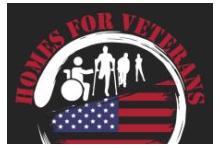Homes for Veterans is a New Jersey-based nonprofit dedicated to improving the lives of disabled veterans by providing barrier-free home modifications—at no cost to them. Founded in 2011 by Douglas DiPaola, a handyman with a heart for service, the organization was built on compassion, community, and hands-on help. After Douglas’ passing in 2020 from COVID-19, his daughter Francesca DiPaola stepped in to carry on his legacy and grow the organization’s reach and impact.
We serve ... Read More
Homes for Veterans is a New Jersey-based nonprofit dedicated to improving the lives of disabled veterans by providing barrier-free home modifications—at no cost to them. Founded in 2011 by Douglas DiPaola, a handyman with a heart for service, the organization was built on compassion, community, and hands-on help. After Douglas’ passing in 2020 from COVID-19, his daughter Francesca DiPaola stepped in to carry on his legacy and grow the organization’s reach and impact.
We serve veterans nationwide, with the majority of our projects in Northern and Central New Jersey. We focus on veterans who are often denied government support—those with non-combat-related injuries, illnesses, or aging-related disabilities.
To date, we’ve completed over 140 barrier-free home modifications, delivered over 1,000 care packages, and collaborated with organizations like Habitat for Humanity, Adopt-a-Soldier Platoon, and Courage and Sacrifice. Our work has earned us every major charity accolade in 2025, including:
2025 GreatNonprofits Top-Rated Charity
2025 Candid Platinum Seal of Transparency
2025 Charity Navigator 4-Star Rating
We’ve seen first-hand the profound impact our work has on the mental health and well-being of veterans. Based on our surveying, 100% of veterans who received barrier-free home modifications reported a significant reduction in PTSD and anxiety symptoms. This, in turn, has helped lower the risk of suicide, as veterans are able to regain a sense of safety and independence in their homes. A barrier-free home provides more than physical accessibility—it is a powerful tool for improving emotional and psychological health.
In 2025, we are proud to expand our mission through two vital new initiatives:
*Building affordable, accessible, and sustainable housing for veterans from the ground up.
*Repairing and revitalizing veteran community centers such as VFWs and American Legions, ensuring these spaces remain active, welcoming, and accessible hubs for connection and support.
At Homes for Veterans, we believe that restoring independence starts at home—but doesn’t end there. We’re building community, honoring service, and ensuring that no veteran is left behind.
Together, accessible living environments and revitalized community centers address both physical and mental health needs, creating an integrated support system that fosters long-term recovery and prevention. Veterans who have access to safe, functional homes and social spaces where they feel understood are more likely to overcome feelings of isolation, regain their independence, and feel a sense of belonging.
Statistics show the profound impact of these initiatives:
--> Approximately 22 veterans die by suicide every day in the U.S. (VA, 2020), and studies have shown that access to barrier-free homes significantly reduces stress and mental health challenges for veterans with disabilities, improving their quality of life and reducing suicide risk.
--> Veterans who are able to live independently in accessible homes report a 40% improvement in mental health and well-being, which includes reduced feelings of depression and anxiety (Journal of Rehabilitation Research and Development, 2015).
--> 68% of veterans say they have experienced social isolation, but those who engage in community-based programs like support centers and group activities report a 50% decrease in loneliness and improved connections with others (National Institute of Mental Health, 2017).
By enhancing veterans' quality of life—both in their homes and within their communities—we are not only preventing suicides but also creating a ripple effect of healing. These initiatives provide a powerful foundation for emotional recovery and the restoration of hope, reminding veterans that they are valued, supported, and never alone.
Hide Full Text